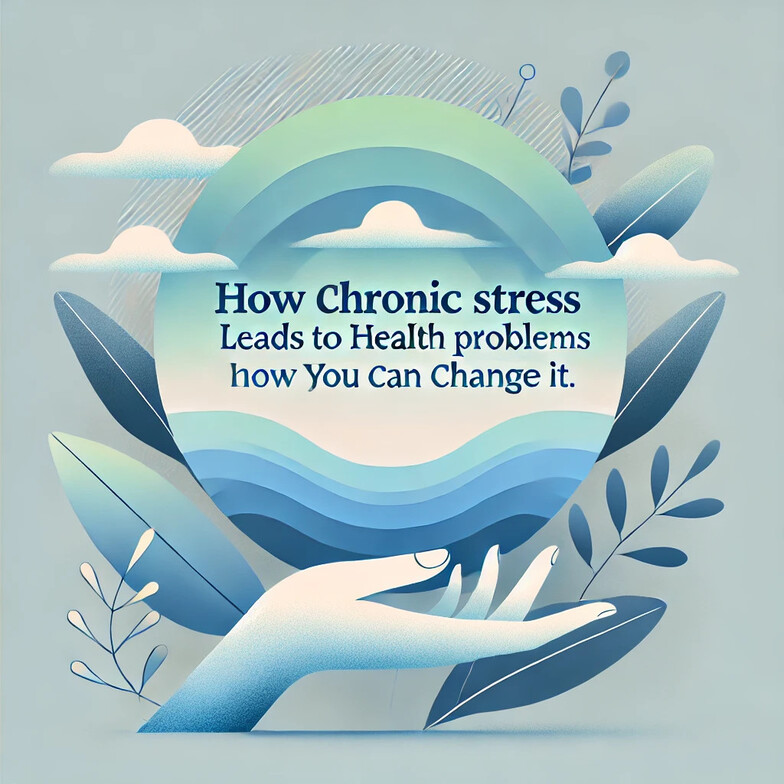
How Chronic Stress Leads to Health Problems and How You Can Change It
In today’s fast-paced world, chronic stress is an all-too-common experience that can lead to serious health problems like high blood pressure, high cholesterol, high blood sugar, sleep issues, digestive problems, anxiety, and depression. At the root of these issues is the sympathetic nervous system—also known as the "fight, flight, freeze, fawn" system—which is activated when your body perceives a threat.
The Biochemical Response to Stress
When your brain perceives a threat, whether real or imagined, it triggers a cascade of biochemical reactions designed to prepare your body to either confront or flee the danger. This response involves the release of stress hormones like cortisol and adrenaline, which elevate your heart rate, blood pressure, and blood sugar levels. These changes are critical for survival in life-threatening situations, but when the threat is ongoing and not actually life-threatening—such as stress from work, financial problems, or relationship conflicts—this constant state of heightened arousal can wreak havoc on your body.
For a deeper understanding of how stress affects your body's organ systems from a Traditional Chinese Medicine perspective, you can read more here
The Chronic Stress Connection
Many of the patients I see in my clinic suffer from chronic stress, often without even realizing how deeply it affects them. When stress becomes a daily occurrence, your body may remain in a constant state of sympathetic activation, leading to a range of chronic health conditions. This ongoing state of stress can cause:
High Blood Pressure: The persistent release of stress hormones constricts blood vessels and increases heart rate, which can lead to hypertension.
High Cholesterol and Blood Sugar: Stress hormones also trigger the liver to release glucose and fatty acids into the bloodstream, which can elevate cholesterol and blood sugar levels over time.
Sleep Issues: Chronic stress disrupts the balance of sleep-regulating hormones, leading to insomnia or poor-quality sleep.
Digestive Problems: The stress response can inhibit digestion, leading to issues like bloating, constipation, or diarrhea.
Anxiety and Depression: Prolonged stress can deplete neurotransmitters like serotonin and dopamine, contributing to anxiety and depression.
My Personal Experience with Chronic Stress
I’ve personally experienced the effects of chronic stress, particularly when I was running my business. I didn’t realize how stressed I was until I started to feel the physical toll on my body. Extreme anxiety became my “normal” state, and I had to undergo significant recovery after experiencing burnout. This experience taught me the importance of being mindful of my internal state and paying attention to how I feel in my body.
Shifting from Stress to Calm: The Role of Acupuncture
One of the most powerful tools I’ve found for managing stress is acupuncture. Acupuncture can help reset the nervous system from a heightened sympathetic state to a more balanced parasympathetic state. Often, patients come in feeling highly stressed, and by the end of the session, they’re surprised at how calm and relaxed they feel. This shift can happen in under an hour, showing how quickly the body can respond to the right intervention.
When patients experience this shift, I encourage them to notice how different they feel and to recognize that this change is possible. Knowing that their body can transition from stress to peace in such a short time can give them hope and empower them to make lifestyle changes that support long-term health.
Lifestyle Changes to Manage Stress
Managing stress is entirely possible with the right approach. Here are some daily practices that can help regulate your nervous system and reduce stress:
Mindfulness and Meditation: Practice being present in the moment and aware of your thoughts and bodily sensations. This can help you identify when you’re in a stressed state and make it easier to shift to a calmer one.
Regular Physical Activity: Exercise is one of the most effective ways to reduce stress. It helps to release endorphins, improve mood, and regulate blood pressure and blood sugar levels.
Balanced Diet: Eating a diet rich in whole foods, lean proteins, healthy fats, and plenty of vegetables can help stabilize blood sugar levels and support overall health.
Adequate Sleep: Prioritize getting 7-9 hours of quality sleep each night. A regular sleep schedule and a calming bedtime routine can improve sleep quality.
Acupuncture: Regular acupuncture sessions can help maintain a balanced nervous system and prevent the negative effects of chronic stress.
Deep Breathing Exercises: Engaging in deep, diaphragmatic breathing can activate the parasympathetic nervous system, promoting relaxation and reducing stress.
Final Thoughts
Chronic stress doesn’t have to be a permanent state. By making mindful lifestyle changes and exploring tools like acupuncture, you can significantly reduce stress and improve your overall health. Your body is always giving you clues about how it’s doing—pay attention to those signs and take proactive steps to support your well-being.
I hope this article empowers you to better understand your stress levels and take actionable steps toward a healthier, more balanced life. Remember, change is possible, and your body has an incredible ability to heal when given the right support.

Tanya Kelloway
Contact Me




